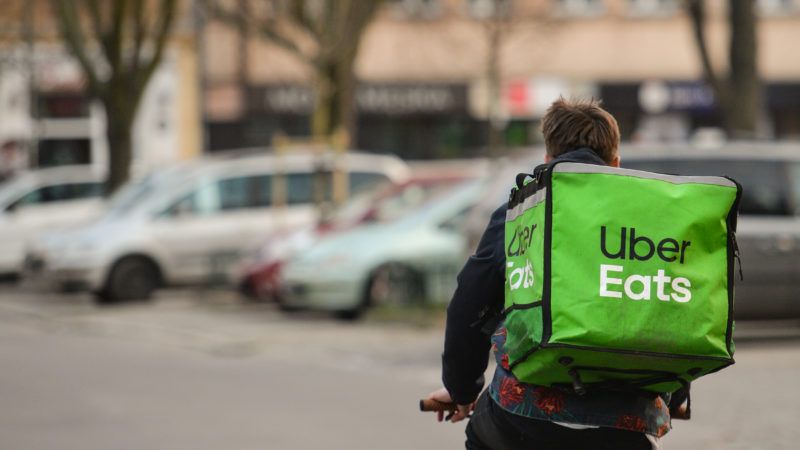Anti-Tech Warriors Are Coming for Your Food Delivery Apps
Plus: Good news on COVID-19 immunity, court nixes California ammunition ban, and more...

"Protect Our Restaurants" campaign calls on Congress, regulators, and city governments to intervene. As the Trump administration continues its all-points crusade against tech companies, food delivery services such as Uber Eats, Doordash, Postmates, and GrubHub could be the next target. A new advocacy campaign is calling on the Federal Trade Commission (FTC) to investigate these companies for potential violations of federal antitrust law.
"The campaign has worked with several lawmakers, including House consumer protection subcommittee chairwoman Rep. Jan Schakowsky's (D–Ill.) office, to apply more pressure on the FTC for an investigation," Morning Consult reports.
Tons of consumers and businesses across the U.S. use and enjoy food delivery apps. They allow individuals to patronize restaurants that might not otherwise offer delivery services; they allow businesses to expand their audience; they provide flexible gig work for delivery drivers. But restaurants are expected to pay relatively high fees for this service. So a number of them have stopped using these apps and, sometimes, have beefed up their own delivery services or put more marketing into encouraging customers to call directly for delivery.
That's how things tend to go as new, "disruptive" technologies shake up old business models. Consumer choice is expanded. New jobs are created. And existing businesses have to step up their game or face dwindling profits—but also enjoy get a chance to reach more customers and expand their revenue. It's a good opportunity for smaller businesses with flexibility and room to grow.
Unsurprisingly, entrenched food businesses with established audiences tend not to like delivery apps. They don't like giving app companies a cut of their profits, and they don't like giving customers new options for places to eat. They're competition. And they've been gaining use since the pandemic started, with people stuck at home and restaurants often closed for in-person dining.
The people who wants to quash food delivery apps don't say that, of course. They say apps are "exploiting restaurants, workers, and consumers" and taking "money out of the local economy."
But their "Protect Our Restaurants" campaign is basically cronyist lobbying, asking the government to intervene so a favored class of businesses can make more money without improving services. We've seen similar crusades from newspapers, hotels, and other industries whose old business models have been undercut by the internet.
Politics is also fueling this campaign. In addition to support from restaurants, the Protect Our Restaurants campaign is backed by activists with a broader mission against tech companies (and corporations more generally). The American Economic Liberties Project is a project of the Open Market Institute, whose "anti-monopoly" program's mission "is to develop and promote law and policy designed to structure markets and corporate behaviors in ways that ensure a fair and equitable distribution of opportunity, wealth, and power within our society." Their solutions usually revolve around greater government regulation.
Just as Trumpian politicians have seen great success mobilizing animosity at tech companies for their own political purposes, this line of attack is proving profitable for Democrats. Last week, for instance, a "future of antitrust" fundraiser—co-headlined by Sen. Amy Klobuchar (D–Minn.), ranking member of the Senate Judiciary Committee antitrust subcommittee, and Rep. David Cicilline (D–R.I.), who chairs the antitrust subcommittee of the House Judiciary Committee—served as way to raise money for the Biden Victory Fund. Tickets to the online ranged from $250 to $10,000.
Hating tech companies is a good business and good politics, once again.
I recently talked with tech policy and law experts recently about the bipartisan backlash against TikTok, Twitter, Google, Facebook, Apple, Amazon, and other popular tech tools and companies. Check that out here.
QUICK HITS
"What sets them apart, and makes them more dangerous to marginalized people, is that they combine counterterrorism (War on Terror), anti-drug, anti-immigrant, and anti-poverty tactics to target the sex industry." @themayamorena investigates Deliverfund
https://t.co/lcstYQAYJm— WeAreTryst (@trystlink) August 17, 2020
• Some good news on COVID-19 immunity: "Scientists who have been monitoring immune responses to the virus are now starting to see encouraging signs of strong, lasting immunity, even in people who developed only mild symptoms of Covid-19, a flurry of new studies suggests."
• The latest election poll:
CNN National Poll (change from last):
Biden 50 (-5)
Trump 46 (+5)While last months 14 point lead was clearly an outlier, this is the closest the race has been in a CNN poll yet.
Trump leads among men by 16 as Biden leads women by 23.
Biden leads among independents by just 1.
— The Darkest Timeline Numbersmuncher (@NumbersMuncher) August 17, 2020
• The 9th Circuit Court of Appeals said Friday that California's ban on high-capacity ammunition magazines is unconstitutional.
• A new study on access to opioid addiction treatment found that "pregnant women were about 20% less likely to be accepted for treatment than nonpregnant women."
• A federal court has "dismissed a lawsuit filed by two inmates who challenged the Maine Department of Corrections policy on early releases during the COVID-19 pandemic."


Show Comments (374)